Complaints Management: Changing Attitudes and Behaviours
1/30
There's no tags or description
Looks like no tags are added yet.
Name | Mastery | Learn | Test | Matching | Spaced | Call with Kai |
|---|
No analytics yet
Send a link to your students to track their progress
31 Terms
clinical standards of frequently sued dentists is different or same to those who do not get sued?
same
Many complaints will conclude how?
produce no evidence of negligence, although the patient perceives a shortfall in the care that they received
What is a complaint?
Expression of dissatisfaction
Spoken or written with a particular aspect of your dental practice
CQC care quality commission says about complaints? (7)
People must understand how to make a complain about a service
They should feel encouraged and feel confident to do so
Complaint process is easy
People given help and support when needed (modern phone/ computer access)
involves all parties involved
There is an opportunity to be involved in the response
provider uses accessible information or support if they need to raise concerns
Complaints are effectively handled including? (5)
Openness and transparency
confidentiality - (records you don’t write they made a complaint - its another system)
regular updates (Every 2 weeks)
timely response (3 WD) and explanation of outcomes
formal record
systems and process are important why?
protect people from discrimination, harassment or disadvantages
Complaints are logged why?
Monitored to assess trends and shared with the wider team
used to learn and drive continuous improvement
help highlight were changes or improvements are needed
What are the GDC six core principles in responding to complaints?
1- All your feedback is important for us
2- we want to make it easy for you to raise a concern or complain if you need to
3 - we follow a complaints procedure and keep you informed
4 - we will try to answer all you questions and any concerns you raise
5- we want you to have a positive experience of making a complaint
6- your feedback helps us improve our services, set out a clear picture of what patients can expect when providing feedback or making a complaint
What is the complaints journey? (8)
training
identifying complaint
accepting all complaint
gathering views
resolving dissatisfaction
responding sympathetically
following up
learning from the complaint
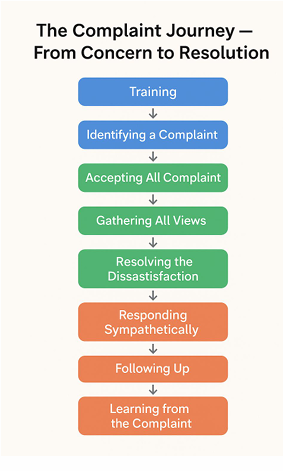
step 1 in handling complaints?
who usually make good complaints handlers?
most of the dental team have no ?
training in these skills is found to be effective
Training
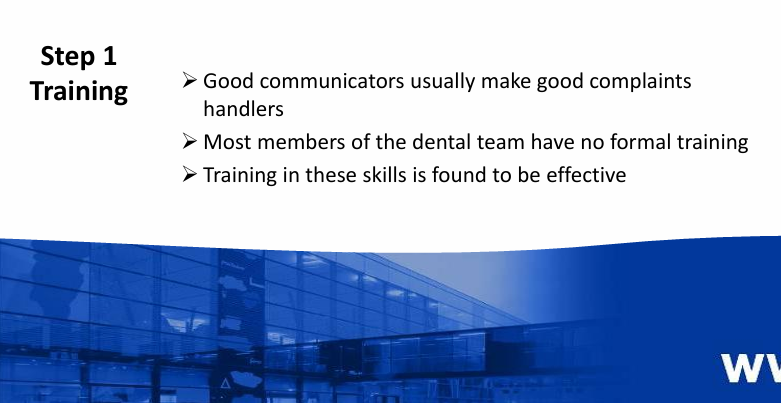
Step 2 in handling complaints?
do majority of dissatisfied patients complain?
ways of identifying dissatisfaction? (4)
Identifying complaints
no, they leave and go elsewhere
comment cards, surverys, identify body language, encourage patients to tell you
A lot of it is running late - let the patient know so that they rebook or if they are happy to wait - place importance on the patients time!, check lab work the day before (ring the lab or change appointment of the patient with 24 hours notice)
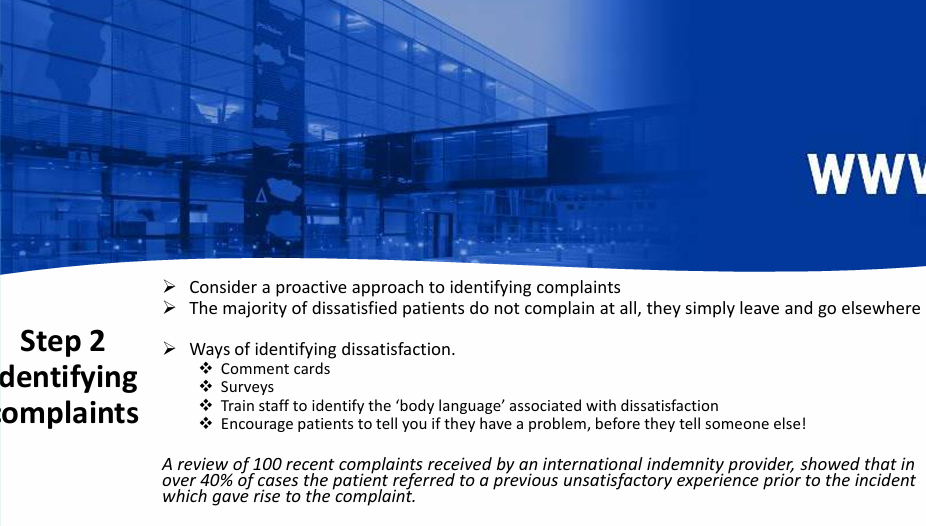
Step 3 in handling complaints process?
the complaints handles will coordinate what? (3)
all complaints must be acknowledged how quickly?
What must you avoid doing? (2)
a patient is more likely to react favourably if what?
Accepting complaints
acceptance, investigation and response to complaint
quickly
overpromising and underdelivering
they know that their complaint has been accepted and is being dealt with
important to be neutral
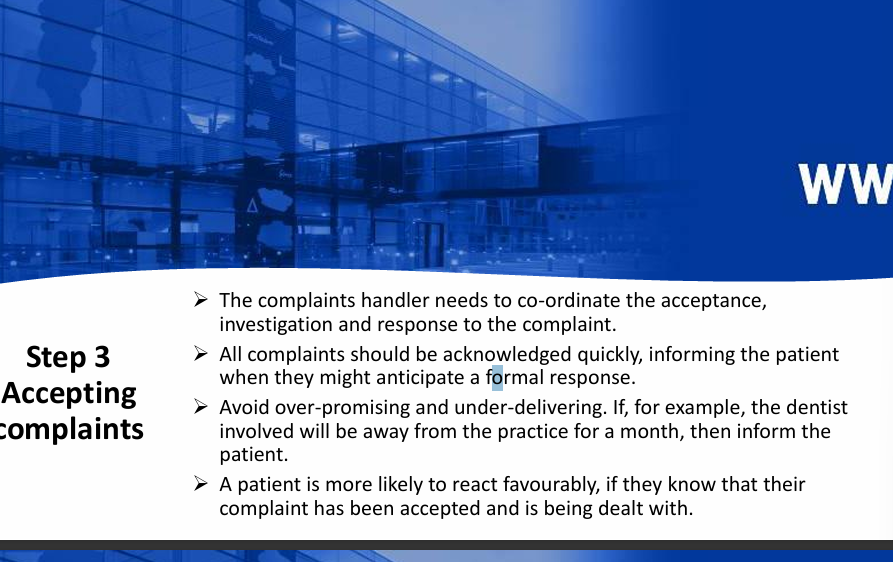
What is step 4?
what must you not do if the person has left the practice/clinic
obtaining the views of all the parties involved
ID everyone who is involved
generate a response on their behalf
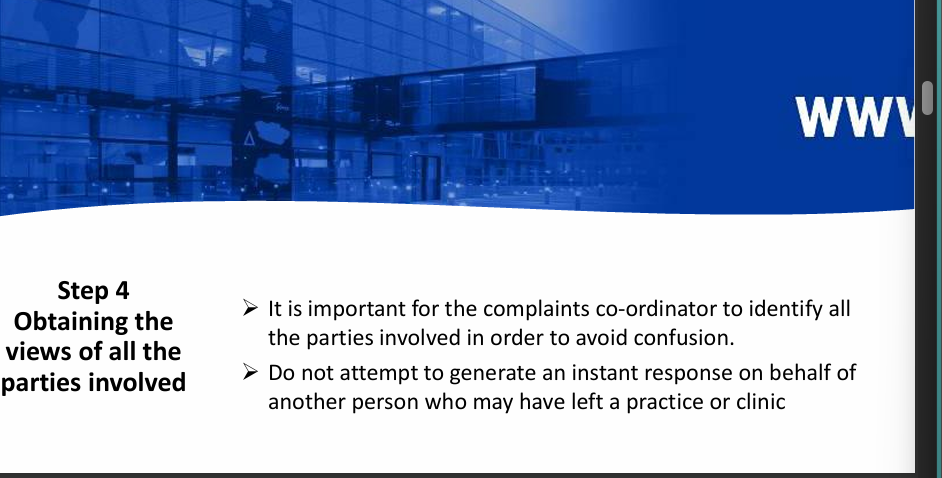
Step 5?
What do you not provide before investigating an gathering facts?
it is important to remember that any response to a complaint could be what?
why is a response following a full investigation better?
Investigate fully (complaint may not be the end point - they might want to take it further)
Detailed response
read out at a later hearing
more thorough, accurate, fairer to all parties involved
only facts no opinions
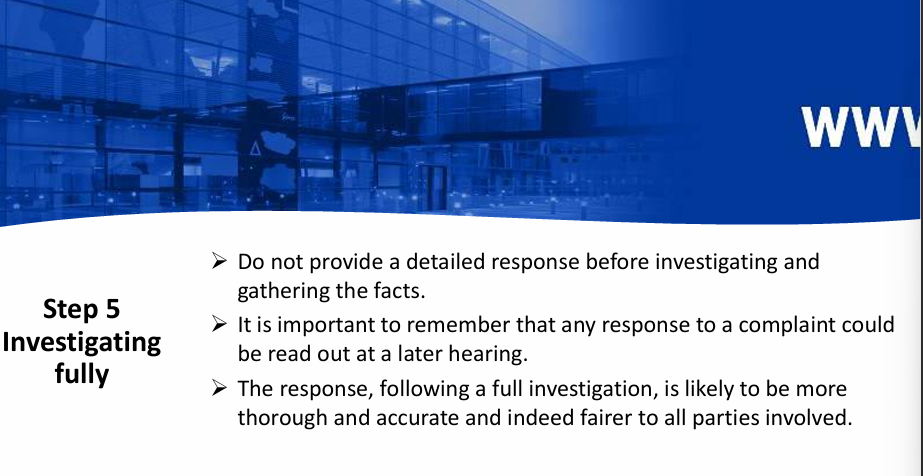
Step 5
When a complaint is received, what are 3 possible outcomes for the clinician to make about the patient?
Resolving dissatisfaction
retain the patient, agree to differ, resolve the patients’ dissatisfaction
compensation - money back on ‘poor’ service they received, apologies
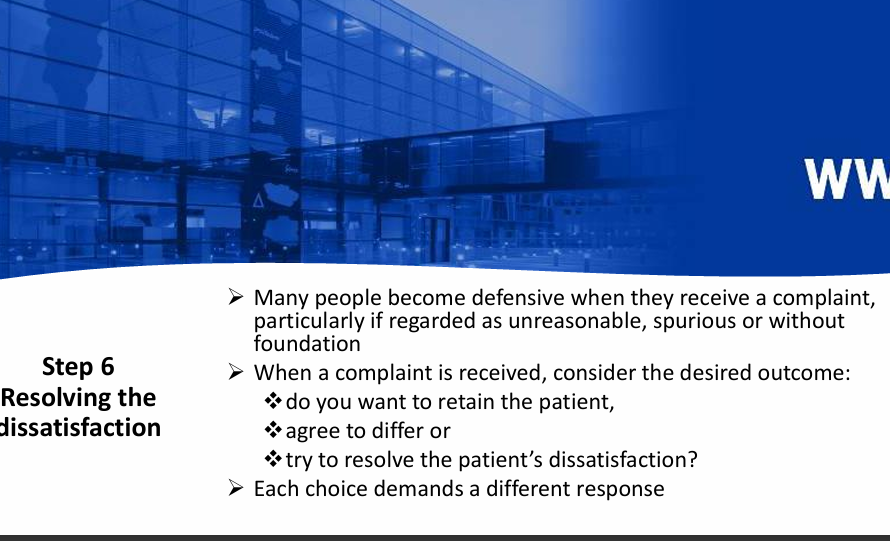
Step 6:
What could you send to the patient after the complaint has been resolved?
a written response may include? (5)
Responding sympathetically
Short letter
Explanation/reassurance/apology/compromise/way forwards
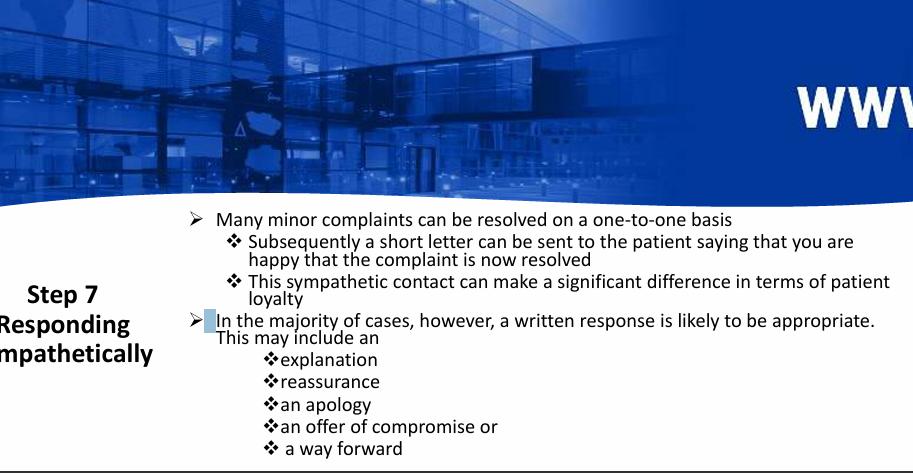
Step 7?
why may a follow-up be useful?
Follow up
retain confidence of the patient - it can demonstrate care and consideration
some don’t want to come back
Offer another appointment, come back early so its before work for the pt/ money back/not see you again/ work into your lunch
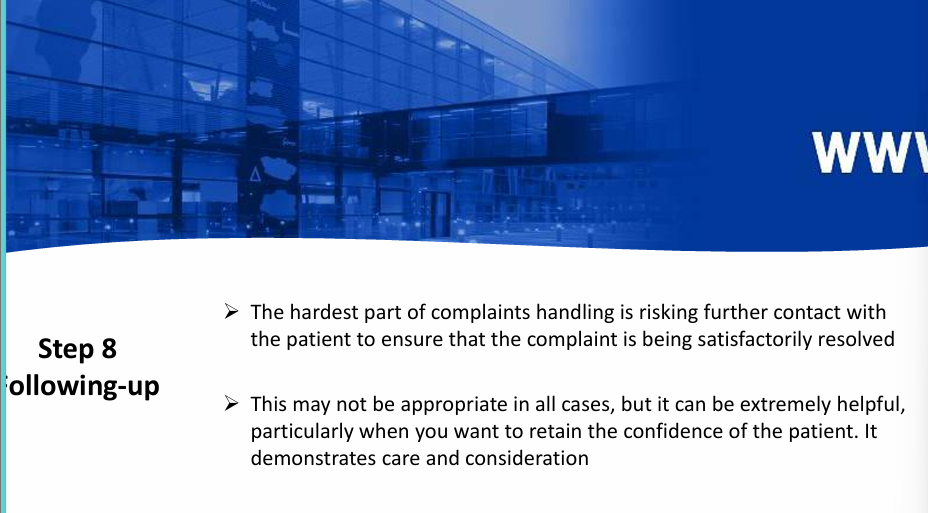
Step 9
what are some question to ask for future risk management?
Learning from the problem
How it arose/steps to avoid/handling/did you achieve the desired outcome?
train selves to become better in the area of the complaint - reflective practice
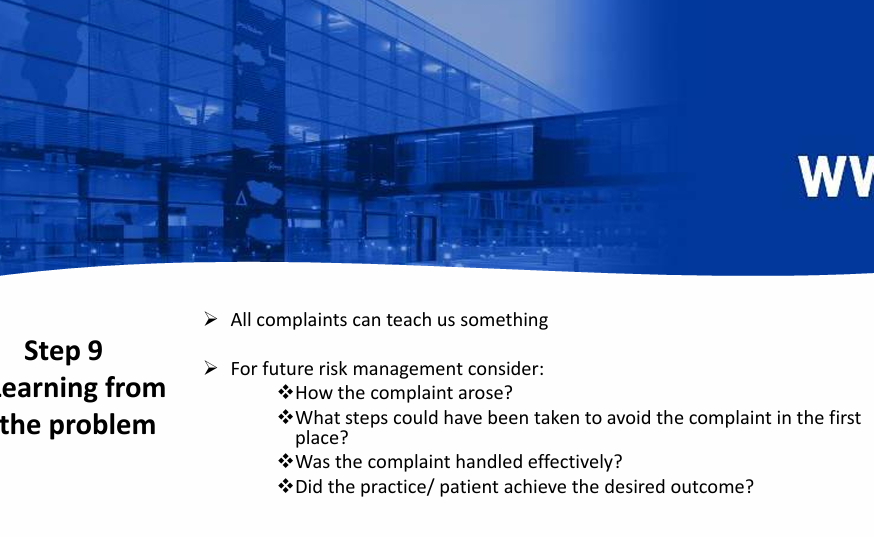
reflecting on the complaint journey
Try and see it from the patient’s perspective from the start
Telling the patient what the process is - don’t want patient to have a complaint about the complaint process
patient and their family - you might come in on a Saturday when ordinarily you wouldn’t, to keep the patient if they really want something done before they leave on holiday
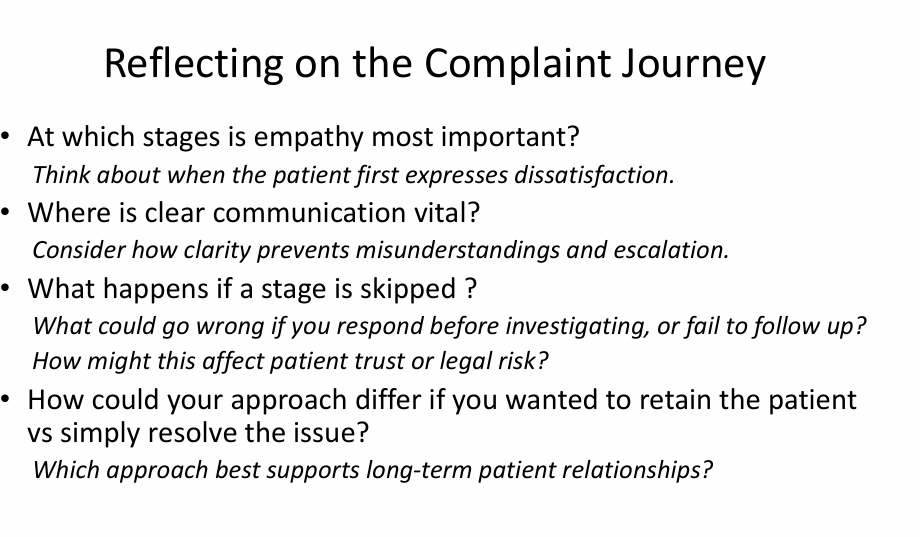
What are 5 things patients are looking for?
1- to be heard
2- an explanation
3- apology
4-appropriate remedial action
5- redress - financial compensation
explanation is more objective, stop trying to justify before you have looked into things as this involves more emotions/opinions
Why do some unhappy patients not complain? (4)
more hassle than what its worth
too time consuming
don’t know where to go to make the complaint
don’t think it will be taken seriously
where else can people complain to apart from the clinical practice
clinical setting
escalate - parliamentary and health service ombudsman
statements to avoid?
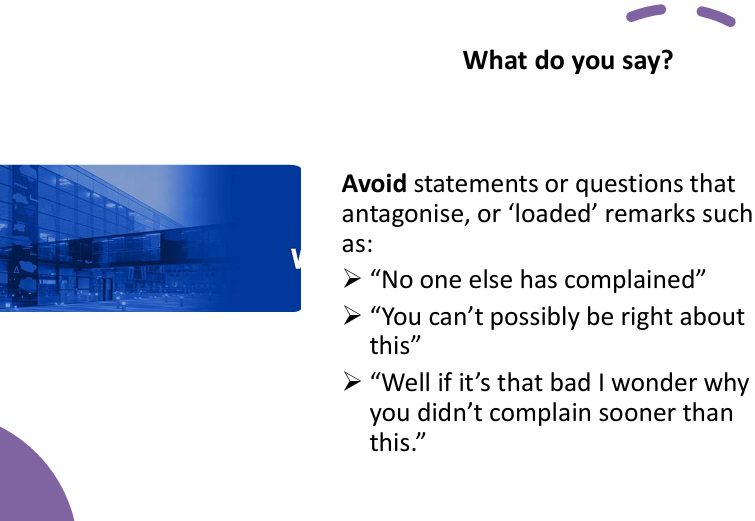
What type of questions should you be asking?
open questions
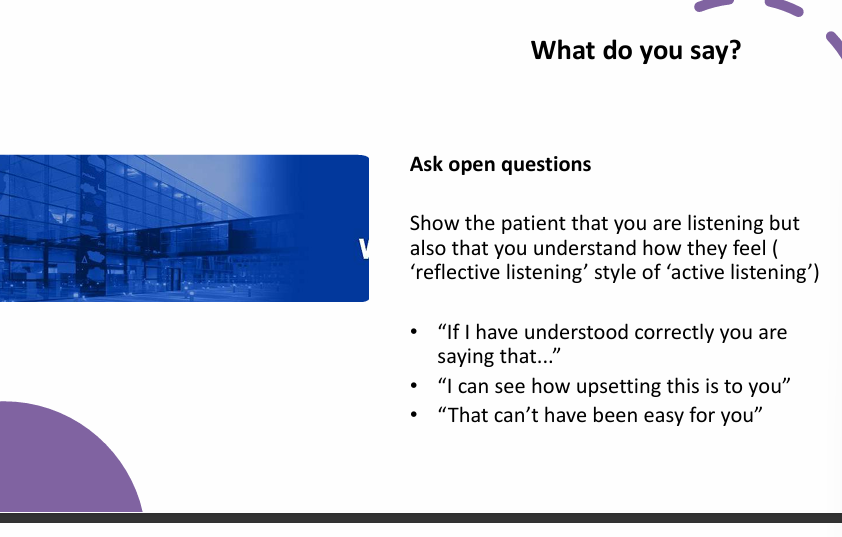

What is the learning point of this?


What is the learning point from this?





What is important about whitening?
Managing patient expectations - don’t promise - whitening may not occur to the extent they want they might not achieve the shade they want so you don’t pay for treatment you didn’t get what you wanted cant tell how much lighter their teeth will get until you have done the treatment
consultation and follow up consultation - better to meet their expectations if you tell them the expectations
evidence about patients complaining
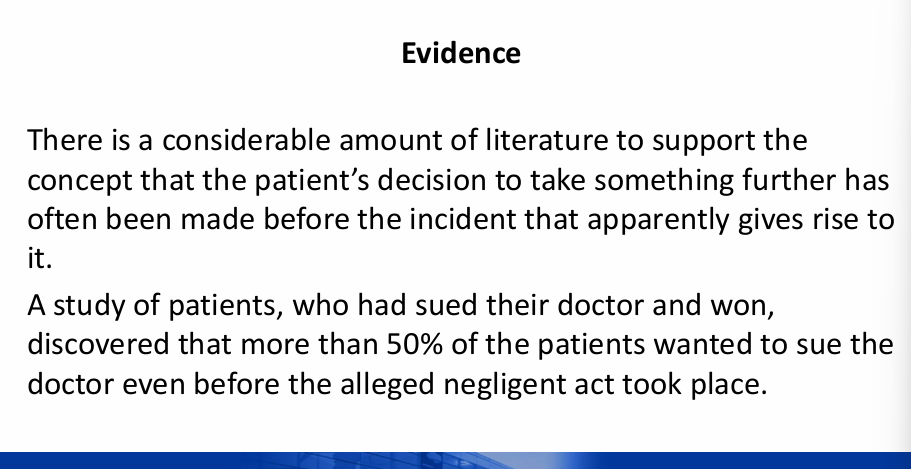
qualities of dentists that don’t get any complaints
